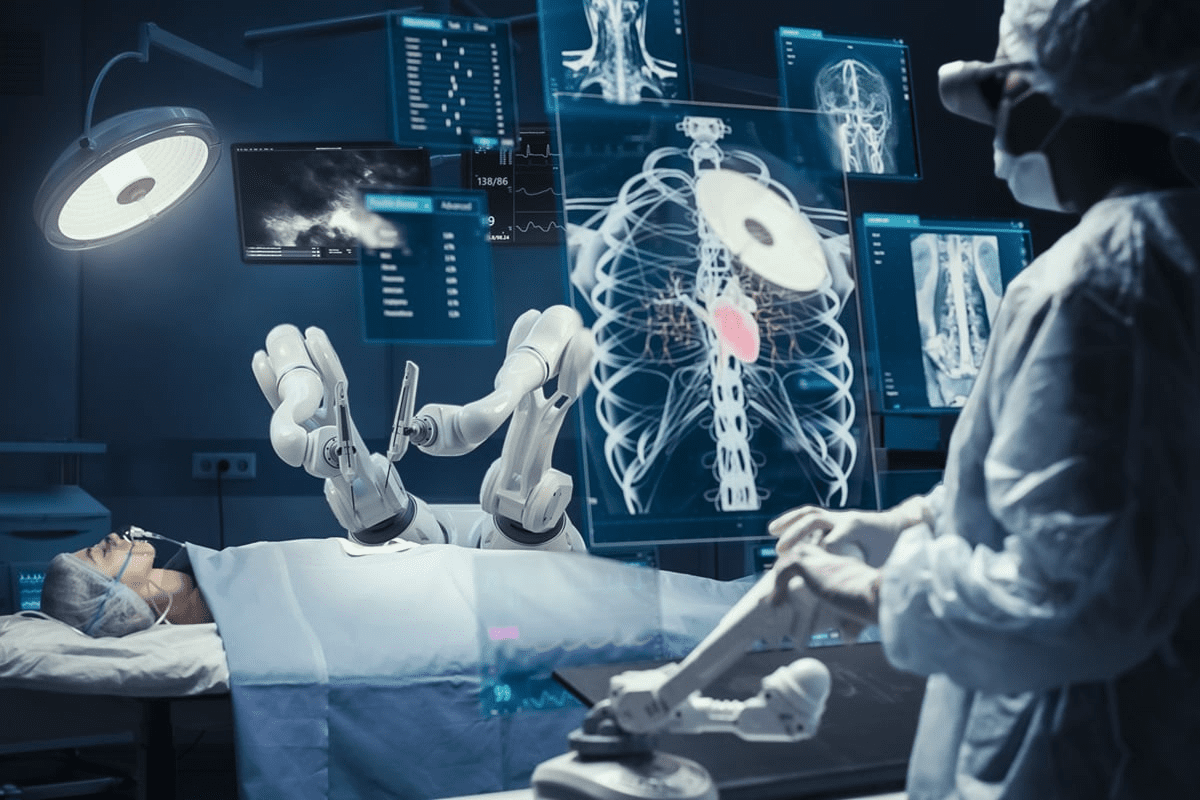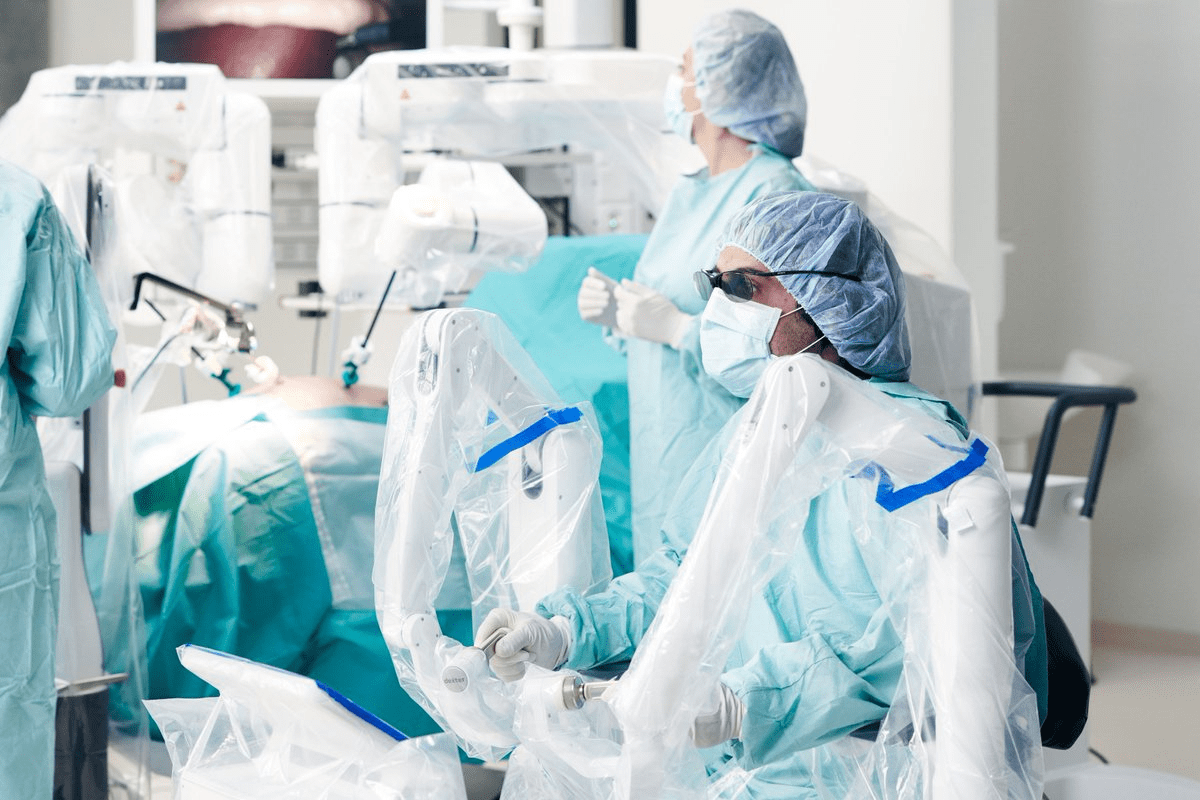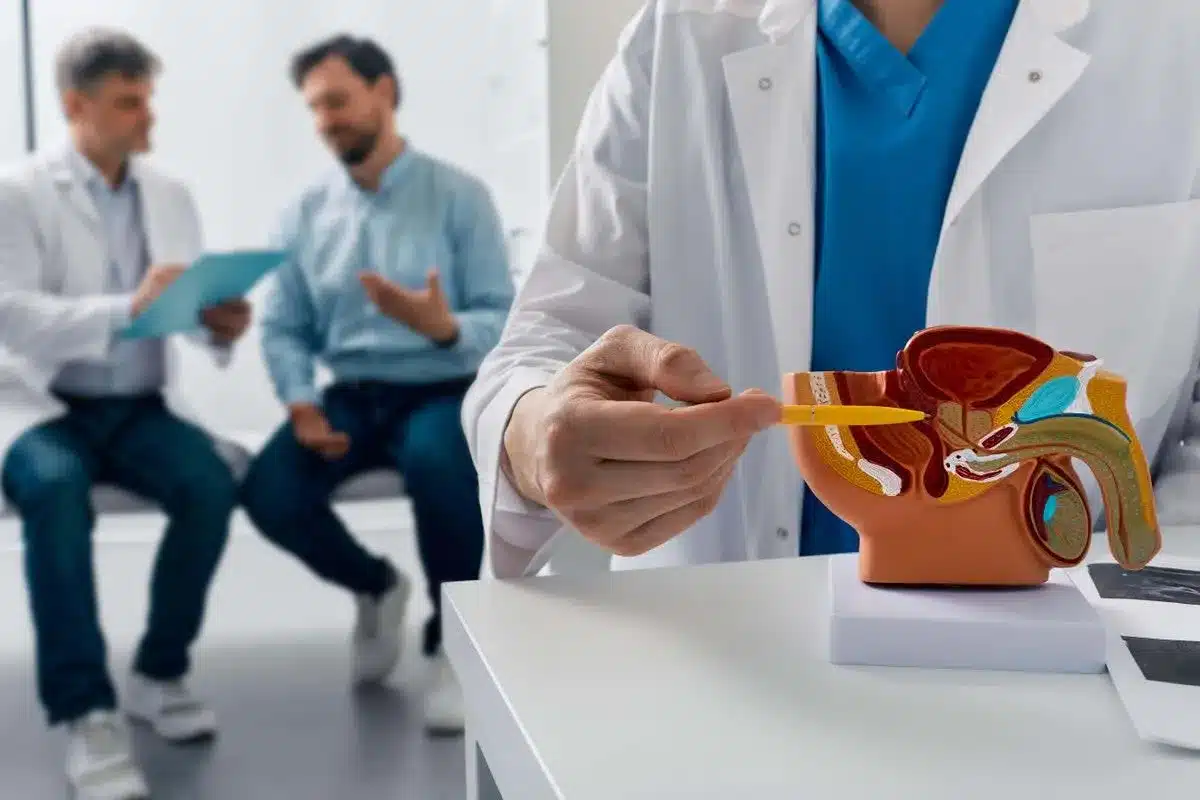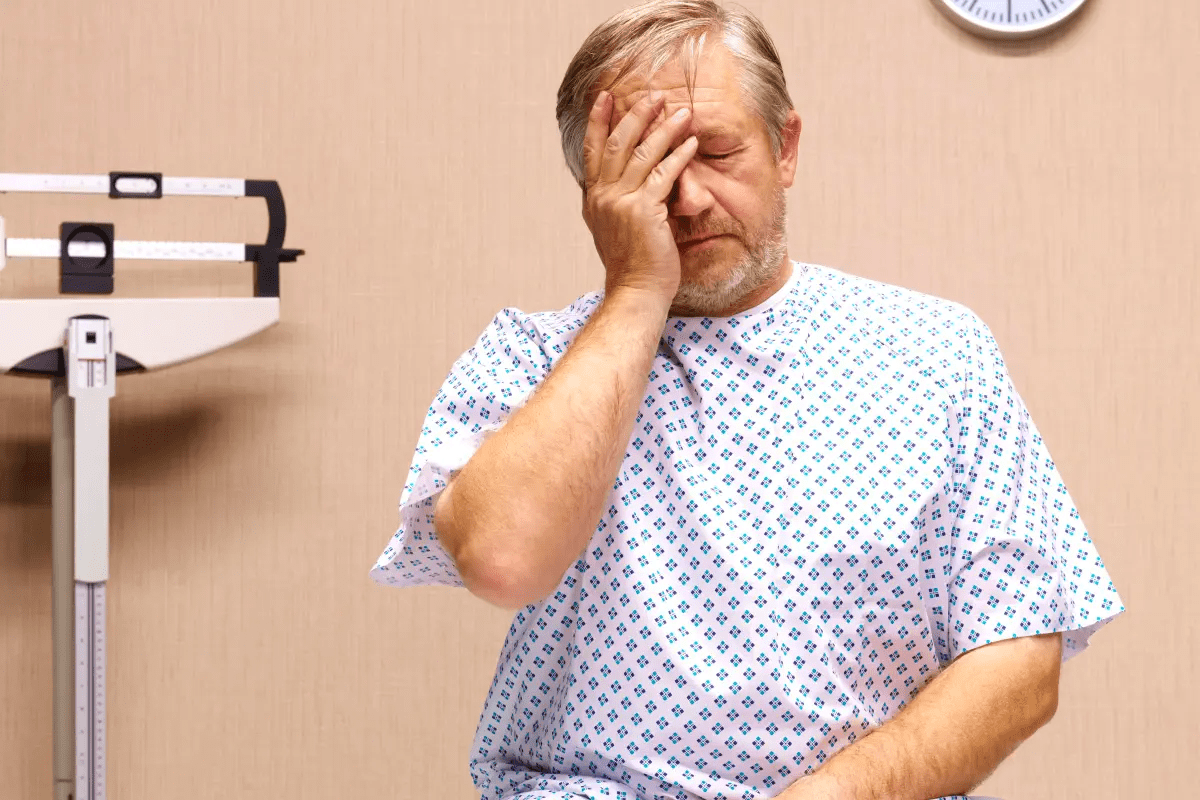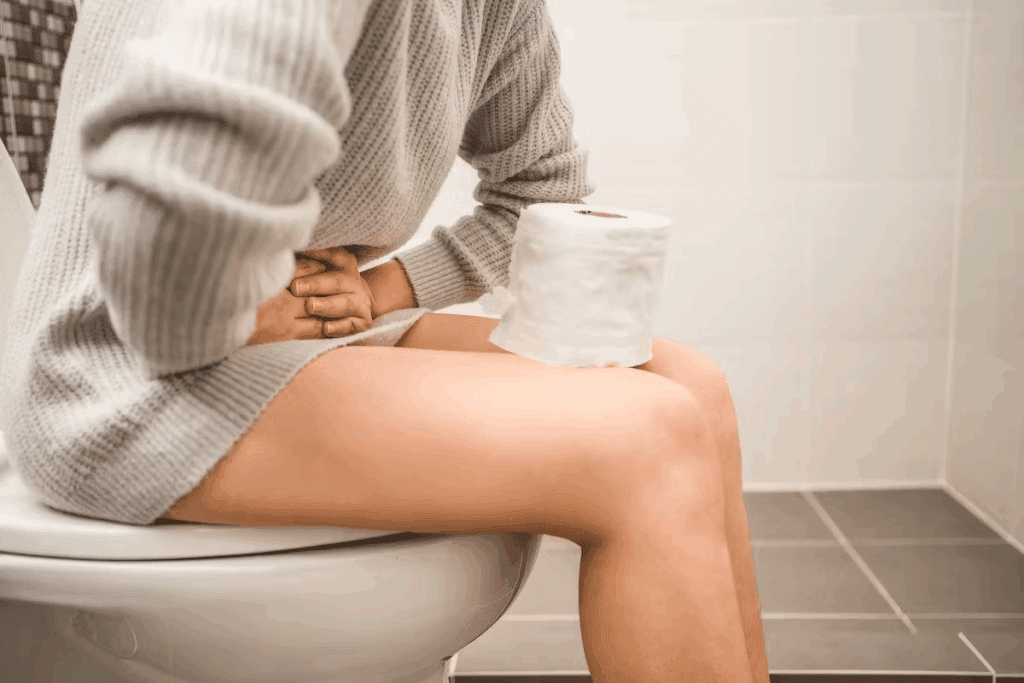
Kidney stones are hard, crystallized deposits that form in the kidneys. They affect about 12 percent of the world’s population. These stones are known for causing intense pain in the urinary tract. But, their impact can also extend beyond the kidneys.Can kidney stones cause diarrhea? Learn about the body’s pain response and how it can affect the gastrointestinal tract.
New research shows a surprising link between kidney stones and digestive issues like diarrhea and nausea. We will look into how stone-related pain and inflammation can affect your digestive system. We will also explore what factors might connect these conditions.
Key Takeaways
- Kidney stones can indirectly contribute to digestive issues.
- Research indicates a link between kidney stones and gastrointestinal symptoms.
- Understanding this relationship is key for better patient care.
- Stone-related pain and inflammation can affect the digestive system.
- Underlying factors can link kidney stones to gastrointestinal symptoms.
Understanding Kidney Stones: Prevalence and Formation
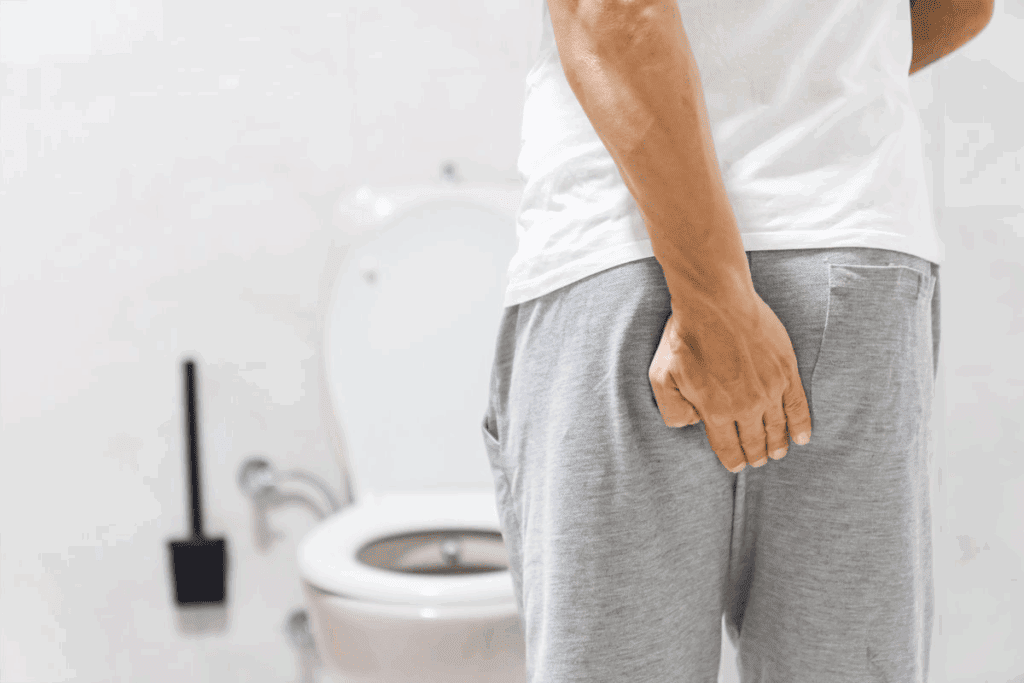
Kidney stones are a big deal for public health, mainly in the U.S. They affect about 12 percent of the world’s people. In the U.S., around 600,000 cases happen every year.
What Are Kidney Stones?
Kidney stones are hard, mineral-based deposits that form in the kidneys. They can occur anywhere in the urinary tract, from the kidneys to the bladder. Diet, extra weight, certain health conditions, and some medications or supplements can cause them.
Kidney stones can cause a lot of pain. They might also make you feel nauseous or vomit. Some people with kidney stones may also have diarrhea with kidney stones. But the link between the two is complex.
How Common Are Kidney Stones in the United States?
Kidney stones are a big health problem in the U.S. About 1 in 10 people will get a kidney stone at some point. The rate varies by region due to diet, climate, and genetics.
Region | Prevalence Rate |
Northeast | 8% |
South | 12% |
West | 10% |
Midwest | 9% |
Risk Factors for Developing Kidney Stones
Several factors can increase your risk of getting kidney stones. These include:
- Dietary factors: High sodium, animal protein, and foods high in oxalate
- Family history: If your family has a history of kidney stones, you’re more likely to get them
- Medical conditions: Certain conditions like hyperparathyroidism and cystic kidney diseases
- Dehydration: Not drinking enough water can lead to concentrated urine
- Obesity: Being overweight or obese raises your risk
Knowing these risk factors helps prevent kidney stones. It’s also important to recognize that kidney stones and diarrhea symptoms can sometimes be related. This is key for good patient care.
“The relationship between kidney stones and gastrointestinal symptoms like diarrhea is complex and requires further investigation to understand the underlying mechanisms.” – Medical Expert, Nephrologist
By looking into the prevalence, formation, and risk factors of kidney stones, we can understand their impact on the body. This includes how they might affect other systems, like causing diarrhea with kidney stones in some people.
Common Symptoms of Kidney Stones

Knowing the symptoms of kidney stones is key to getting help quickly. These stones can cause a variety of symptoms, from mild to severe. This includes pain and other signs that affect the whole body.
Primary Symptoms and Warning Signs
The main sign of kidney stones is sharp, intense pain. It usually hits in the side, lower back, or belly. This pain, called renal colic, can be very bad and spread to the groin or genitals.
Other common symptoms include:
- Severe pain in the back, side, or lower abdomen
- Nausea and vomiting
- Blood in the urine (hematuria)
- Fever and chills if an infection is present
- Painful urination
- Urinary urgency or frequency
A kidney stone usually doesn’t show symptoms until it moves. This movement can block the flow, causing the pain we associate with kidney stones.
When to Seek Medical Attention
Knowing when to see a doctor is important. If you have any of these symptoms, get help right away:
Symptom | Description |
Severe pain | Pain that is unbearable or persists despite pain medication |
Fever and chills | Indicates a possible infection that requires urgent treatment |
Vomiting | Frequent or severe vomiting that leads to dehydration |
Blood in urine | Visible or microscopic hematuria that persists |
Difficulty urinating | Inability to urinate or painful urination |
As a medical professional once said,
“The key to managing kidney stones effectively lies in early detection and understanding the underlying causes of their formation.”
Spotting symptoms early can greatly improve treatment results.
If you think you might have kidney stones, see a doctor. They can diagnose and suggest the best treatment.
The Connection Between Kidney Stones and Digestive Symptoms
Kidney stones can make patients uncomfortable and affect their health. We will look at how kidney stones impact digestive symptoms. This creates a complex situation that needs a deep understanding.
Gastrointestinal Manifestations
Kidney stones can cause various digestive symptoms. The pain from passing a stone can be very sharp and painful. This pain can also affect the digestive system.
Common gastrointestinal symptoms associated with kidney stones include:
- Nausea and vomiting
- Abdominal pain
- Changes in bowel habits, such as diarrhea
Studies show that kidney stones can cause nausea and vomiting. This happens because of the pain and how it affects the nervous system. It shows we need to treat kidney stone patients in a more complete way.
Why Digestive Symptoms Often Go Unrecognized
Many patients with kidney stones don’t get their digestive symptoms noticed. This can cause delays in diagnosis and treatment.
The reasons for this underrecognition are multifaceted:
- Lack of awareness about the connection between kidney stones and gastrointestinal symptoms
- Variability in symptom presentation among patients
- Focus on treating the kidney stone without addressing associated symptoms
Healthcare providers can offer better care by understanding the link between kidney stones and digestive symptoms. This way, they can treat both the stone and its effects on the patient’s health.
Will a Kidney Stone Cause Diarrhea?
Kidney stones mainly affect the urinary system. But, research shows they might also cause diarrhea. This connection is interesting and worth looking into to understand how kidney stones affect the body.
Research on Kidney Stones and Diarrhea
Studies have looked into how kidney stones and diarrhea are connected. Research shows that while diarrhea isn’t a direct symptom, it can happen, mainly in kids and adults with early symptoms. The pain from kidney stones might affect how we digest food.
Indirect vs. Direct Relationships
The link between kidney stones and diarrhea is indirect. Chronic diarrhea can lead to kidney stones because of dehydration. It’s important to treat both conditions together for the best care.
Knowing that diarrhea can be linked to kidney stones helps in better patient care. Healthcare providers need to look at all symptoms when treating kidney stone patients.
Nausea and Vomiting with Kidney Stones
People with kidney stones often feel sick to their stomach or throw up because of the pain. Nausea and vomiting are common when someone has a kidney stone, mainly during episodes of renal colic. The pain can make the nervous system react, causing these stomach problems.
How Pain Triggers Nausea
The pain from kidney stones can make you feel sick in several ways. When a stone blocks the urinary tract, it causes sharp pain in the lower back and belly. This pain can make the nervous system send signals to the stomach and intestines, leading to nausea and vomiting.
The pain from a kidney stone can also start the body’s stress response. This releases hormones like adrenaline and cortisol. These hormones can slow down digestion, making you feel nauseous and uncomfortable.
Managing Kidney Stone-Related Nausea
To manage nausea from kidney stones, you need to try different things. Here are some ways to help:
- Stay Hydrated: Drinking lots of water can help move the stone out and prevent dehydration from vomiting.
- Pain Management: It’s important to manage pain well to reduce nausea. Medications like ibuprofen or acetaminophen can help with pain and discomfort.
- Anti-Nausea Medications: Sometimes, doctors may prescribe anti-nausea meds to help with vomiting and nausea.
- Dietary Changes: Eating small meals often and avoiding spicy or fatty foods can help with nausea.
Understanding why nausea happens with kidney stones and using these strategies can help patients feel better. It makes treatment more comfortable.
Mechanisms Behind Kidney Stone-Related Digestive Symptoms
To understand kidney stone-related digestive symptoms, we must explore the connection between the urinary and gastrointestinal systems. Kidney stones can start a chain reaction that affects both systems.
Pain-Triggered Nervous System Activation
The pain from kidney stones can set off a chain reaction in the nervous system. This can lead to changes in bowel movements, causing diarrhea. A study found that the pain from kidney stones can affect many parts of the body.
“The pain associated with kidney stones can be so severe that it triggers a systemic response affecting multiple bodily systems.”
Inflammation and Irritation Pathways
Inflammation and irritation from kidney stones can also cause digestive symptoms. The urinary and gastrointestinal tracts are close, making it easy for inflammation to spread. This can cause nausea and changes in bowel habits.
Urinary Tract Infections as a Mediating Factor
Urinary tract infections (UTIs) can also play a role. UTIs can happen with kidney stones and make symptoms worse. It’s important to consider UTIs when treating patients with kidney stones.
In summary, kidney stone-related digestive symptoms come from a mix of pain, inflammation, and UTIs. Knowing how these factors work together helps us manage and prevent these symptoms.
The Kidney Stone-IBS Connection
Research has found a strong link between kidney stones and irritable bowel syndrome (IBS) in adults. A study in Taiwan showed that adults with kidney stones were more likely to get IBS. This shows how kidney stones and stomach problems are connected.
Findings from the Taiwan Study
The Taiwan study shed light on the link between kidney stones and IBS. It found that people with kidney stones were more likely to get IBS. This means kidney stones might predict IBS.
Key findings from the study include:
- A strong link between kidney stones and IBS.
- People with kidney stone history face a higher IBS risk.
Timeline of IBS Development After Kidney Stones
Knowing when IBS starts after kidney stones is key for early treatment. The Taiwan study showed that IBS risk stays high for years after a stone episode.
Time After Kidney Stone Episode | Risk of Developing IBS |
0-1 Year | High |
1-3 Years | Moderate |
3+ Years | Low to Moderate |
The table shows IBS risk at different times after a stone episode. The risk is highest in the first year and then drops.
Knowing the link between kidney stones and IBS helps doctors care for patients better. This understanding can improve health management and lower IBS risk.
The Bidirectional Relationship: How Digestive Issues May Contribute to Kidney Stones
Studies have found a link between kidney stones and digestive problems. Some gut issues can raise the chance of getting kidney stones. This shows we need to understand how our digestive health affects our kidneys.
Digestive Disorders That Increase Stone Risk
Crohn’s disease and ulcerative colitis can up the risk of kidney stones. These diseases cause the body to absorb nutrients poorly. This affects how we get calcium and water.
Other digestive problems that might lead to kidney stones include:
- Gastrointestinal surgery, which can change how we absorb nutrients
- Celiac disease, causing us to miss out on calcium and other minerals
- Chronic diarrhea, making us dehydrated and leading to more concentrated urine
Shared Risk Factors Between Conditions
Kidney stones and some digestive issues share common risk factors. These include:
- Dietary factors: Eating too much oxalate, sodium, and animal protein can harm both.
- Dehydration: Not drinking enough water can make urine more concentrated. This is bad for both kidney stones and digestive health.
- Genetic predisposition: If your family has a history of these issues, you might be at higher risk.
Knowing these shared risk factors helps us find ways to prevent both kidney stones and digestive problems.
Diagnosing Kidney Stones When Digestive Symptoms Are Present
Diagnosing kidney stones in patients with digestive symptoms is complex. Symptoms like diarrhea and nausea make it hard to spot kidney stones right away.
Diagnostic Challenges
When patients have digestive symptoms, finding kidney stones is tough. Doctors need to look at many possible causes. They must take a detailed medical history and do a physical exam.
Key diagnostic challenges include:
- Distinguishing between kidney stones and other gastrointestinal issues
- Identifying patients at risk for kidney stones
- Interpreting symptoms that may not be typical for kidney stones
Tests and Procedures
To find kidney stones, doctors use different tests and procedures. These include:
- Imaging studies like CT scans or ultrasounds to see the kidneys and urinary tract
- Urine analysis to look for infection, blood, or mineral imbalances
- Blood tests to check kidney function and for signs of infection or inflammation
Patient Experiences and Case Studies
Patient stories and case studies help doctors understand diagnosing kidney stones better. For example, a patient with severe diarrhea and pain might first seem to have a gut issue. But, a closer look might show a kidney stone.
Looking at these cases helps doctors get better at diagnosing. It’s important to think of kidney stones when patients have strange digestive symptoms.
The complexity of diagnosing kidney stones shows the need for a team effort. Doctors from urology, gastroenterology, and other fields must work together.
Treatment Approaches for Kidney Stones with Gastrointestinal Symptoms
When kidney stones and stomach problems happen together, we need a full treatment plan. It’s important to treat both the stones and the stomach issues well. This helps patients feel better and get better faster.
Managing Both Kidney and Digestive Symptoms
Dealing with kidney stones and stomach problems at the same time is a challenge. We focus on treating the stones and the stomach issues they might cause. This might include drinking lots of water, managing pain, and changing what you eat.
- Hydration: Drinking enough water helps pass the stone and stops new ones from forming.
- Pain Management: It’s key to control pain from the stone and any stomach discomfort or nausea.
- Dietary Adjustments: Changing your diet can help with both stone formation and stomach problems.
Medication Considerations
Medicines are very important for treating pain from kidney stones and stomach issues. We look at different options, like pain relievers and meds for nausea or stomach problems.
Always talk to a doctor before taking any new medicine. It’s important to make sure it’s safe for you.
Dietary Modifications
Changing what you eat is a big part of managing kidney stones and stomach problems. We suggest:
- Drink lots of water to stay hydrated.
- Eat fewer foods high in oxalate if you have calcium oxalate stones.
- Don’t eat too much salt or animal protein.
- Eat more fruits, veggies, and whole grains.
By making these diet changes and working with a doctor, patients can handle their kidney stones and stomach problems better. This can lead to better health outcomes.
Conclusion
Understanding the link between kidney stones and stomach problems is key to good care. Kidney stones can affect more than just the kidneys. They can also impact the stomach and overall health.
We’ve seen how kidney stones can lead to symptoms like diarrhea and nausea. This happens because the pain from the stones can upset the stomach. It’s important for doctors to treat both the stones and the stomach issues together.
By recognizing the connection between kidney stones and stomach problems, we can help patients more. This way, patients get the full care they need. It helps improve their life quality by addressing both the stones and related symptoms.
FAQ
Can kidney stones cause diarrhea?
Kidney stones mainly affect the urinary tract. But, they can also cause stomach problems like diarrhea. The pain from kidney stones can upset the digestive system, leading to diarrhea.
Do kidney stones cause nausea and vomiting?
Yes, kidney stones can make you feel sick to your stomach. When the pain is bad, it can cause nausea and vomiting.
What is the connection between kidney stones and irritable bowel syndrome (IBS)?
Research shows a link between kidney stones and IBS. People who have had kidney stones might be more likely to get IBS.
Can digestive issues contribute to the formation of kidney stones?
Yes, some digestive problems can raise your risk of getting kidney stones. This is because of shared risk factors like diet and metabolism.
How are kidney stones diagnosed when digestive symptoms are present?
Diagnosing kidney stones with stomach problems is tricky. Doctors use tests like imaging and urine analysis to confirm kidney stones.
What are the treatment approaches for kidney stones with gastrointestinal symptoms?
Treating kidney stones and stomach problems needs a full plan. This might include medicine, diet changes, and other treatments based on your needs.
Can kidney stones cause diarrhea and nausea?
Yes, kidney stones can lead to diarrhea and nausea. The pain and discomfort from kidney stones can upset your stomach, causing these symptoms.
Are there any shared risk factors between kidney stones and digestive disorders?
Yes, there are shared risk factors like diet, metabolism, and genetics. These can increase your risk for both kidney stones and digestive problems.
How can kidney stone-related nausea be managed?
To manage nausea from kidney stones, a mix of medicine, staying hydrated, and other support is needed. This helps ease symptoms and prevents dehydration.
Does a kidney stone cause diarrhea directly?
The link between kidney stones and diarrhea is indirect. The pain and discomfort from kidney stones can upset your stomach, leading to diarrhea.
Can you have diarrhea with kidney stones?
Yes, some people with kidney stones may have diarrhea. This is because the pain and discomfort from the stones can upset their stomach.
References
- Bloom, D. A., & Finlay, D. (1922). A roentgen-ray study (including pyelo-ureterography). Journal of the American Medical Association, 79(9), 641–647. https://jamanetwork.com/journals/jama/articlepdf/230490/jama_79_9_013.pdf


